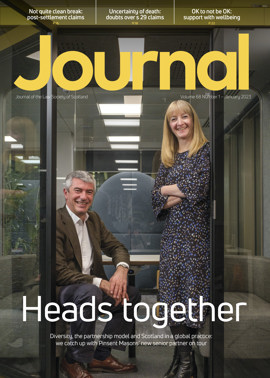Public policy highlights: January 2023
Trusts and succession
The Trusts & Succession Law Committee is reviewing the Trusts and Succession (Scotland) Bill, recently introduced to the Scottish Parliament.
The bill proposes a number of changes in relation to how trusts are administered and managed, as well as limited changes to succession law, including:
- restating statutory provisions on the appointment, resignation, removal and discharge of trustees and decision-making by trustees, and clarifying the law on breach of trust;
- reforming powers of the courts including remedies for the administration of trusts, the liability of trustees in the expenses of litigation, and to remedy defects
in the exercise of trustees’
fiduciary powers; - conferring power on the courts to alter trust purposes in certain circumstances;
- providing for private purpose trusts and appointment of a protector;
- amending the order of intestate succession to provide for a spouse or civil partner to have the right to the whole of the estate if the deceased
is not survived by any prior relative; and - clarifying the rule in s 2(2) of the Succession (Scotland) Act 2016 about the effect of divorce, dissolution or annulment on a special destination.
- The committee would welcome views on the bill’s provisions from members. Send your comments to policy@lawscot.org.uk
Patient Safety Commissioner
The Society’s Health & Medical Law Subcommittee submitted written evidence to the Health, Social Care & Sport Committee of the Scottish Parliament on the Patient Safety Commissioner for Scotland Bill. It highlighted that the establishment of a Patient Safety Commissioner (“PSC”) may contribute to addressing the issues identified by the Independent Medicines & Medical Devices Safety Review (the Cumberledge report), but that much will depend on the detail of the role and how it is delivered in practice. It noted that patient safety depends on a vast and complex system, and that any new role must add further benefit for patients in Scotland, rather than duplicating what already exists.
The written evidence also highlighted the need for the PSC to have clearly defined statutory powers, including powers to obtain relevant information and intelligence from health boards; the importance of the PSC being independent; and the need for clarification on the PSC’s proposed relationship with the Crown Office & Procurator Fiscal Service.
For more information see the research and policy section of the Society’s website.
Regulars
Perspectives
Features
Briefings
- Civil court: Costs – the tail that wags the dog
- Licensing: Keeping alcohol out of sight
- Planning: A framework for sustainability?
- Insolvency: When is a creditor not a creditor?
- Tax: A new, improved autumn statement?
- Immigration: First stop Rwanda?
- Scottish Solicitors' Discipline Tribunal: January 2023
- Civil court: Expenses – barred by delay?
- Property: Transparency, human rights and the registers






